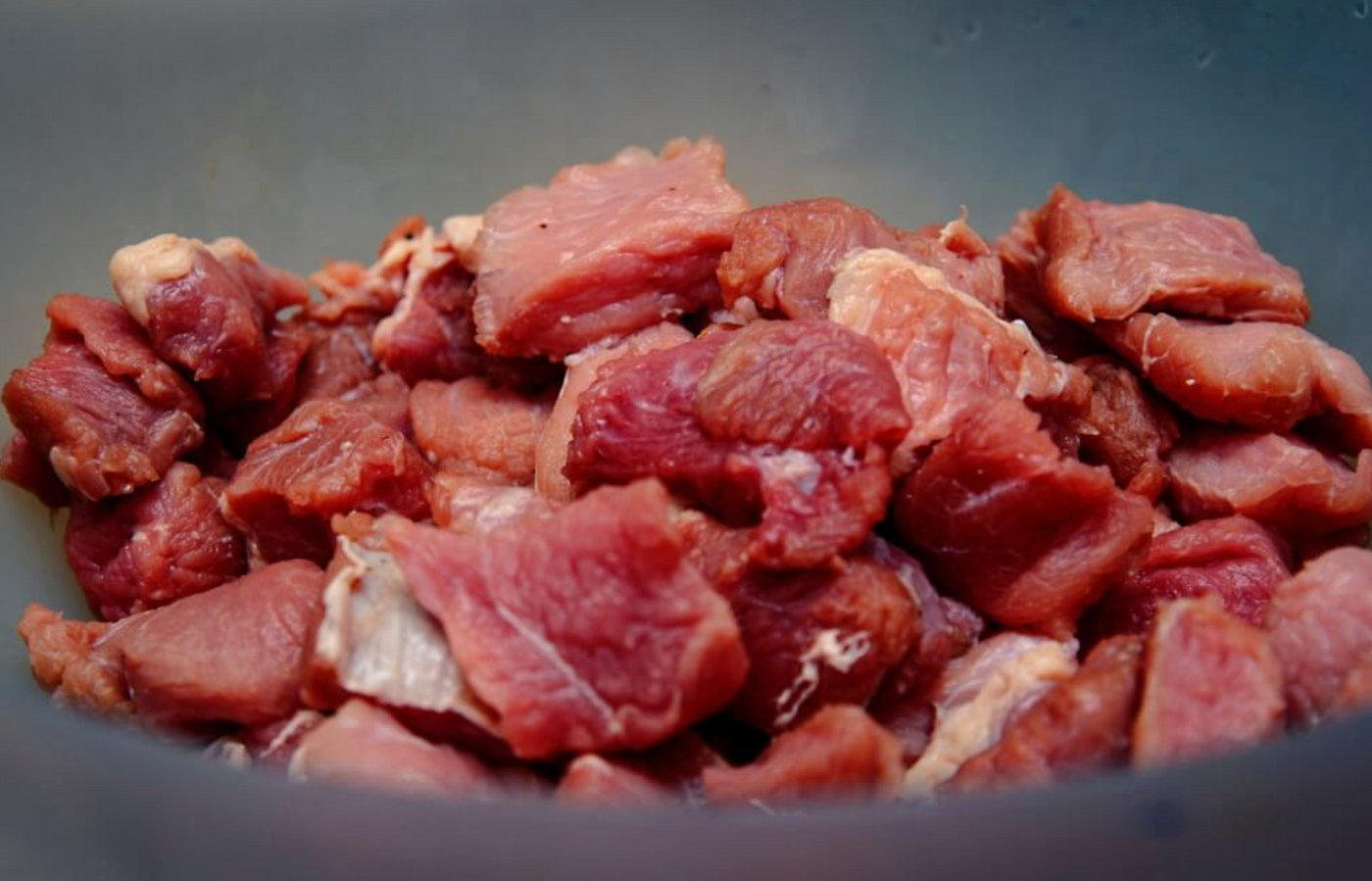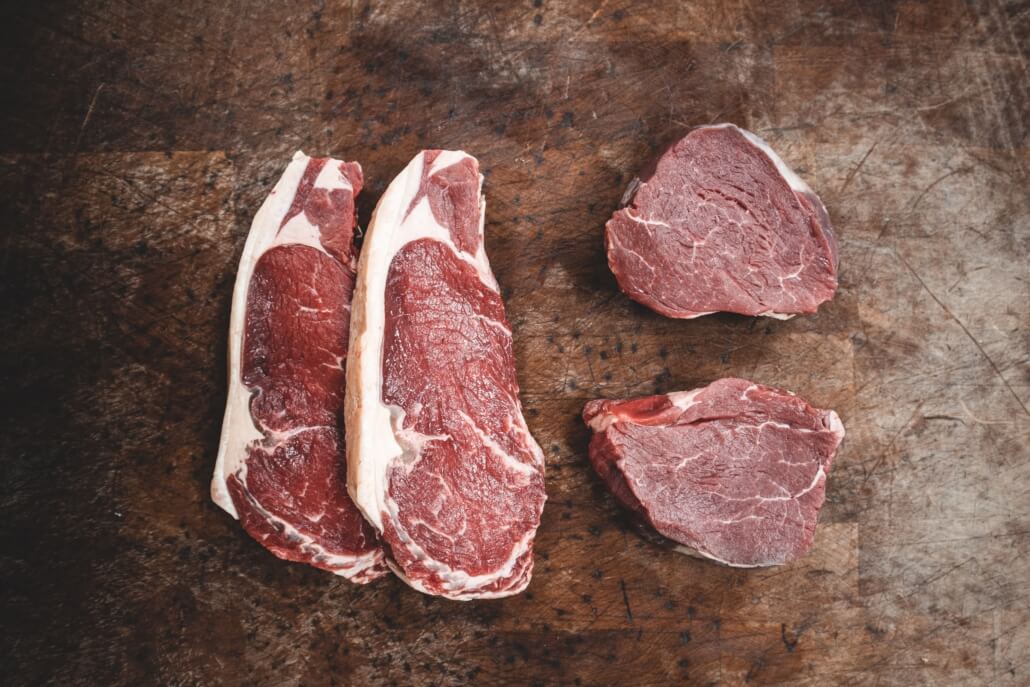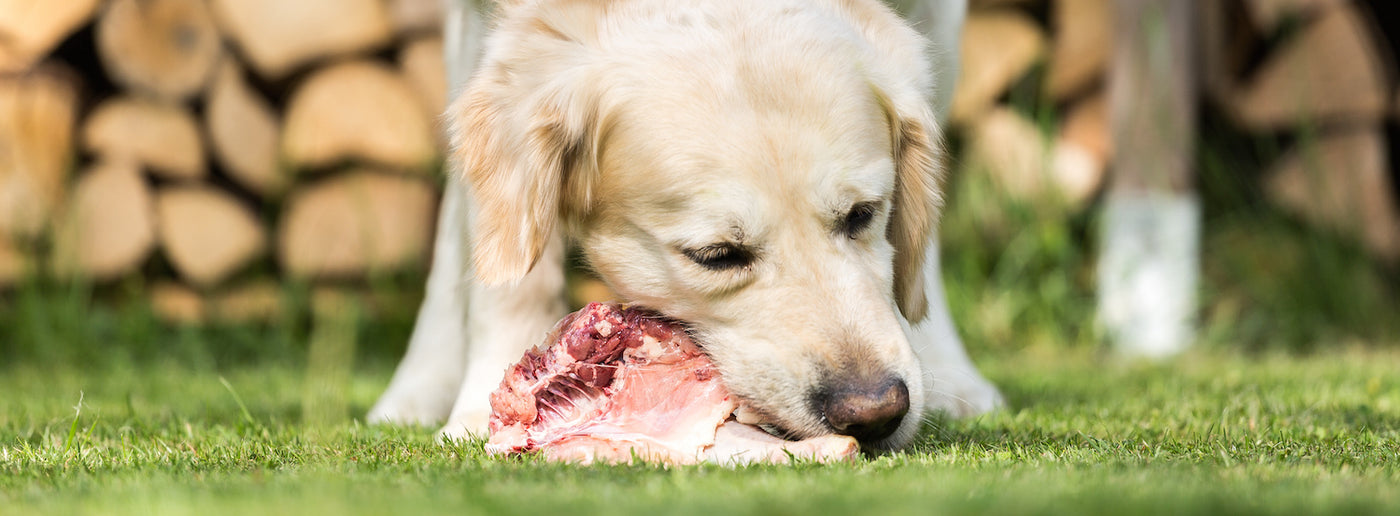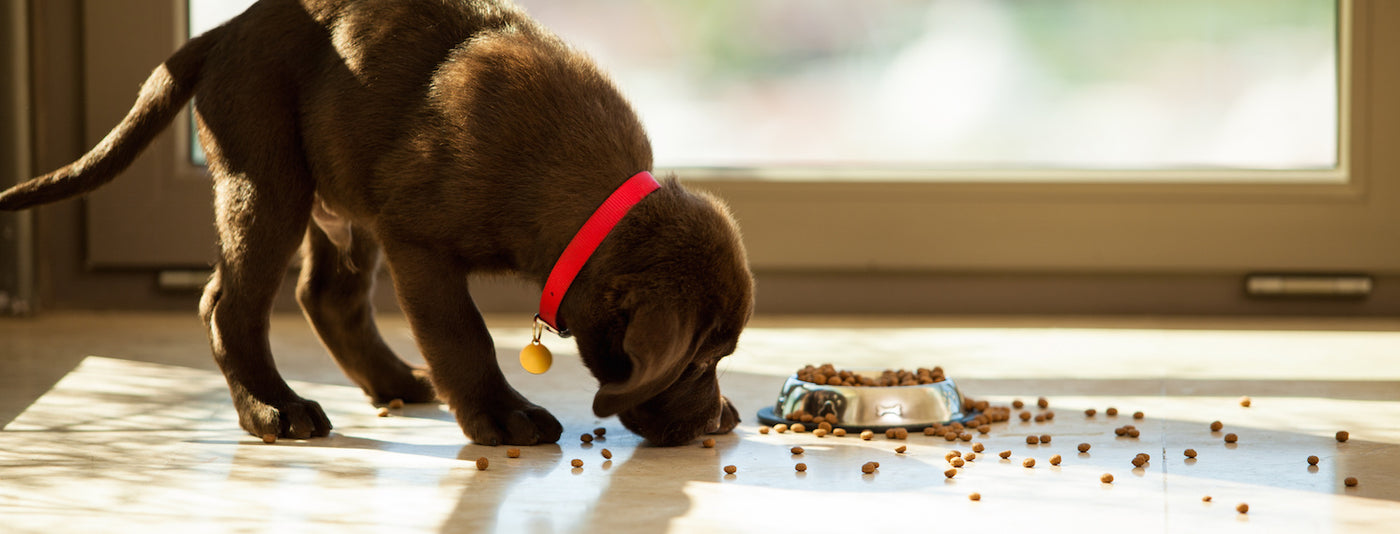
DUCK Complete Dog Food: Feeding in line with nature
We stand by the complete DUCK dog food range for every box that it ticks. Not only does it satisfy the complex nutritional demands of an active dog – it brings feeding in line with nature, fixing a whole stream of issues found within most dogs that are being fed processed foods. Issues with the following are often food related and easily treated with DUCK:
- gastric disorders
- intestinal disorders
- food allergies
- skin problems
- behavioural problems
If your dog has been suffering with any of the above, we highly recommend introducing your dog to the DUCK complete frozen range, you’ll be wishing you made the transition sooner.
Why do we vouch for DUCK?
First things first, it’s suitable for all dogs, regardless of age (yes, even puppies can enjoy it!), breed or size. DUCK Complete Excellent is perfect for working dogs and for puppies, given its excellent mix of natural ingredients which sustain excellent energy levels.
The majority of dog health issues are recovered by switching from a dry diet to a natural diet, because everything starts with a good intestinal flora which, incidentally, is restored with speed (and ease) by feeding DUCK Complete Excellent.
The in’s and out’s of how they make their food
The brand sources meat and organs, such as the heart, liver and kidneys, from European countries, from animals that have been slaughtered for human consumption. Immediately after slaughter the meat is cooled to -18 °C to ensure that it retains the vitamins and minerals. This also prevents bacteriological problems.
As soon as the deep-frozen meat and organs arrive in the DUCK production facility, they check them for quality and temperature. These ingredients are kept at -18 °C in our huge deep-freeze too.
The purpose
The principal mission of DUCK is to provide nourishment that is close to nature, i.e. natural and fresh food, capable of striking the right balance between muscle meat and organs, between germinated cereals and natural meat juices. Fresh and natural, this dog food contains:
- no thickeners
- no taste enhancers
- no colouring agents
Dinner time just got interesting
If your dog is a fussy eater, or has been turning his nose away from the kibble you’ve been offering, natural food is highly pleasurable for them in terms of both smell and flavour, and will encourage a new excitement at dinner time.
Buy it today
At Pooch DVD, we stock the complete DUCK range, with the following flavours available – Goat & Lamb, Beef and Lamb & Rice, including gluten-free options. Buy today and we can honestly say you will not be left disappointed. Click here to shop!
Team up with the Roti Training Sausages for an extra happy, energised and nourished pooch.
- Ben Abimbola
- Tags: Barf diet Dog Food DUCK Health issues Raw diet

Thinking of switching your dog to a raw diet?
One question we get asked a lot – “Is raw feeding best, because our vet isn’t convinced and is encouraging us to feed a commercial complete diet”. Sound familiar? We’ve got the low down on why a raw diet can be hugely transformational for your K9 and their long-term health – and why your vet might be less keen.
Why are vets so hesitant?
Dry food or kibble ingredients will vary by brand but all will meet the basic nutritional needs of a dog for a balanced diet. The required ingredients by law, including portent sources (Such as beef, poultry, fish, and eggs), vitamins and minerals, antioxidants, grains and cereals. Annoyingly, kibble has added preservatives that are needed to avoid the fat in the food from becoming rancid. And much like human food, we know that the ingredients used by certain brands are low-quality, or heavy on carbs – which in turn have a detrimental effect on a K9’s long term health, from skin issues, to bad teeth.
Why so many dog owners are switching to raw
A raw diet follows guidelines that mimic what your dog, or their ancestors would eat in the wild. This means they never use fillers, by-products, artificial flavours, or the nasty preservatives found in most commercial kibbles. Many dog owners have found that switching to raw has addressed allergy issues, gastrointestinal sensitivities and weight issues.
One thing that most people worry about is their lack of knowledge around raw feeding. We’ve researched the best raw foods out there and stocked up on them so that our dog owners can leave us with the complete peace of mind in knowing their pup or dog is equipped with highly nutritious foods to sustain their long-term health and eliminate the degenerative diseases caused by commercial diets.
Introducing DUCK Raw Frozen Meat for Puppies and Dogs
Our most recent favourite added to our shop is the DUCK frozen range, perfect for all ages, including puppies. If you’re keen on switching your dog to a raw diet, we’ll provide you with a handy transition guide to help you ease them in.

How to tell if your dog is allergic to their food
It can often be difficult to pinpoint whether your dog is allergic to a certain ingredient in their food or whether the symptoms they’re experiencing are from something else i.e. the environment., If however, your dog is experiencing some unpleasant and prolonged symptoms that don’t seem to be budging, your vet will be able to run some tests to get to the exact route of the problem. It’s often helpful to know which symptoms to look out for, so we’ve listed the main ones below.
Symptoms to look out for:
- Upset stomach; wind, diarrhoea and/or vomiting
- Unhealthy skin; this could be flaky and dry, itchy or even oozing
- Unhealthy coat; patchy and/or bare in places or even dry
- Frequent sneezing or a runny nose
- Irritating ears, nose or eyes
- Swollen, irritable feet that they regularly lick or bite
Caring for a dog with food allergies
While some dogs are allergic to certain meat types, others are allergic to grains. We’d usually advise seeking vet advice prior to switching foods, however if the vet is unable to pinpoint exactly what ingredient they’re allergic to, the next best option is to try different food types and closely monitor your dogs reaction. If certain meats aggregate them, switch to a new one. If it’s the grains, switch to grain-free. There’s plenty of foods especially catered to dogs with allergies, from Imperial Food, through to Smolke. Many of our customers opt for hypoallergenic foods, avoiding things like wheat, soy, corn, additives and other problem-causing ingredients.
What if it's the environment?
Sadly, if your dog is allergic to something in the environment, its just a case of managing his or her symptoms. The best thing to do would be to bathe him/her every couple of weeks with a medicated shampoo, which will help to relieve the discomfort they may be in.
Foods we recommend for dogs with allergies or sensitive digestion:
- Smolke Grain-Free for adults
- Smolke Grain-Free for puppies
- Smolke Sensitive
- ImperialFood 1st Class
- ImperialFood StarFish
- Naturis Freshly Steamed Meat
Shop our complete food range today - you won't be disappointed...
- Ben Abimbola
- Tags: BARF diet Dog Allergy Dog Food Dog Health Dog Nutrition Hypoallergenic

Protein - Is your dog getting enough?
One of the most essential ingredients to your dog’s diet is of course protein. Whether from meat, fish, eggs and some plant matter, your dog needs protein in order to thrive. Why? Protein based foods help to support healthy development, which is particularly important for growing pups.
From muscle tone and bone strength, through to the functioning of nerves and even the condition of a dog’s coat, are all things supported by foods rich in protein.
And while most dogs love to run around, that energy is fuelled by protein. If your pooch is lacking meat from their life, you’ll notice a lack of energy, insufficient body weight and a poor coat - just to name a few symptoms. Of course, meat isn’t the only ingredient a dog will thrive from, but protein should make up a large part of their meal and if it doesn’t - it could be time for a change.
Wondering where to start? Changing your dog’s food immediately can sometimes upset their tummies. If you’re thinking of changing their food, try to do so gradually, introducing more of the new food each meal time, gradually replacing the old food.
When it comes to choosing a new food, sometimes the labels can be slightly bare in terms of specifying exactly how much of one food type exists in the packet. If this is the case, remember that ingredients will be listed largest to smallest, so we’d expect meat to be at the very top of that list. You’ll probably find that many dog foods found in supermarkets are filled with processed, cheap or insufficient protein sources that aren’t good enough to keep your dog in great health.
Here at Pooch DVD, we only stock the very best products for pets - you’ll notice the ‘Recommended by Pooch DVD’ stamp on all of the brands that we feature. That’s because we take pet health seriously and support other like-minded brands that do too.
Browse our best-selling food section to see what our fellow dog-owners love!
- Ben Abimbola
- Tags: BARF diet Dog Food Dog Health Dog meat Dog Nutrition Protein

Cereals and grains - Good or bad for our dogs?
As dog owners, we’re becoming more and more aware about exactly what it is we’re putting into their bodies and whether or not their nutritional demands are being satisfied by the very food we spend our hard earned money on. One question we get asked a lot here at Pooch DVD is whether or not we should be avoiding pet food containing cereals and grains and whether they’re damaging to our pet’s health.
Firstly, cereals and grains refers to anything from wheat, rice and barley through to oats and maize - all of which tend to be the usual accompaniment to the meats you’d expect to find in pet food. But are they good or bad?
Anyone that knows us here at Pooch DVD will know that we’re big supporters of protein based diets for dogs. After all, canine bodies flourish when fed nutritional, high energy meats. We’re not supporters of the processed pet foods found in most supermarkets - these are by no means beneficial to your much loved pet. You’ll probably find that brands whose pet food contains cereals and grains haven’t done so for your dog’s nutritional benefit - instead they’re there to act as a cheap filler, to make your dog’s tummy feel fuller and to ultimately increase their profits.
Just like us humans, every dog and the way in which their body reacts to food, is unique. Some dogs may have sensitive tummies that aren’t able to easily digest certain cereals and grains, while other dogs may well be able to. Grains and cereals may not necessarily be damaging to your pet’s health, but if the food in which your pet is eating has substituted healthy ingredients for more filling material, this could pose a health problem later down the line. It’s also worth noting that if you notice that your dog is producing unhealthy stools or their skin/coat is looking unhealthy, opting for grain-free pet food such as Smolke can often work wonders.
- Ben Abimbola
- Tags: BARF diet Cereals & grains Dog Food Dog Health Dog Nutrition

What is a BARF Diet?
BARF dieting - what every dog owner needs to know
BARF dieting is by no means a new concept, however more and more dog owners are now turning to this form of feeding due to the amazing benefits it can have on pet health and wellbeing.
In fact, this type of dieting has proven to offer a natural and healthy solution to a whole range of health problems, including relief from digestive problems, allergies, degenerative diseases and even skin conditions.
What does BARF dieting mean?
For those of you that aren’t familiar with the term, BARF stands for Biologically Appropriate Raw Food or Bones and Raw Food. This diet consists of raw whole foods, such as meat, bones, fat, organ meats, fruit and vegetables.
What about shop bought dog food?
Cooked and processed foods are a big no-no when it comes to BARF dieting, as are any foods containing preservatives, colouring agents, additives, grains or other fillers designed to make a dog feel fuller for longer. A lot of supermarket bought pet food contains some of these harmful ingredients, which can cause a whole range of long-term health problems for pets, as opposed to the wonderfully healthy benefits of a barf diet.
So, what are the benefits of a BARF diet?
- Relief from irritating skin conditions, particularly those caused by allergies
- A shiny coat thanks to the range of nutrients and vitamins
- Healthy teeth and a fresher breath, including minimal tar build-up
- Leaner, trimmer weight and healthier shape
- Strengthened immunity thanks to the perfect balance of essential nutrients, vitamins and fatty acids
- Easier on the tummy and therefore ideal for dogs with digestion problems
- Quick and easy absorption of nutrients given the natural ingredients
- Increased mobility and improved energy levels
- Reduced stool odour, a clear sign of healthy digestion
- A longer, healthier and happy life
Interested in a BARF diet for your cat or dog?
If you’re looking to introduce your dog, or cat for that matter, to a BARF diet, why not browse our range of fresh, natural and incredibly healthy food products!
- Ben Abimbola
- Tags: BARF diet Cat Diet Cat Food Dog Diet Dog Food Dog Health Dog Nutrition Raw Foods